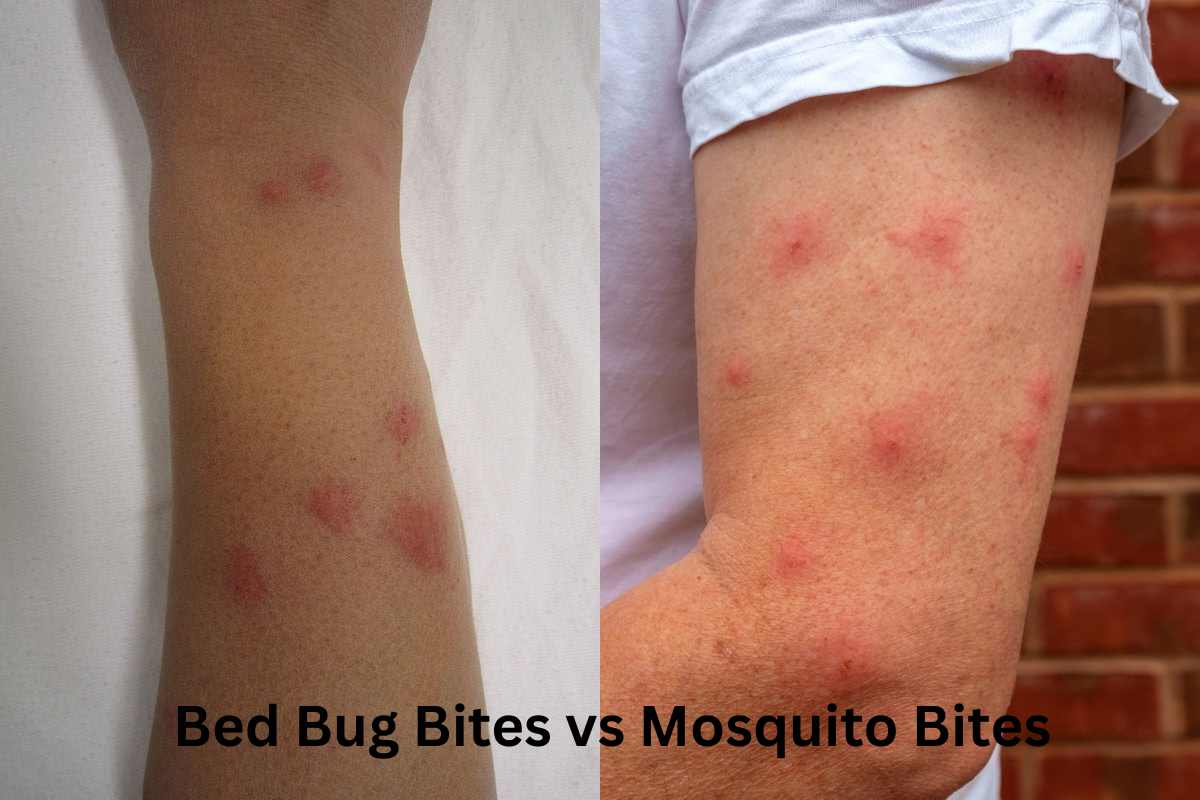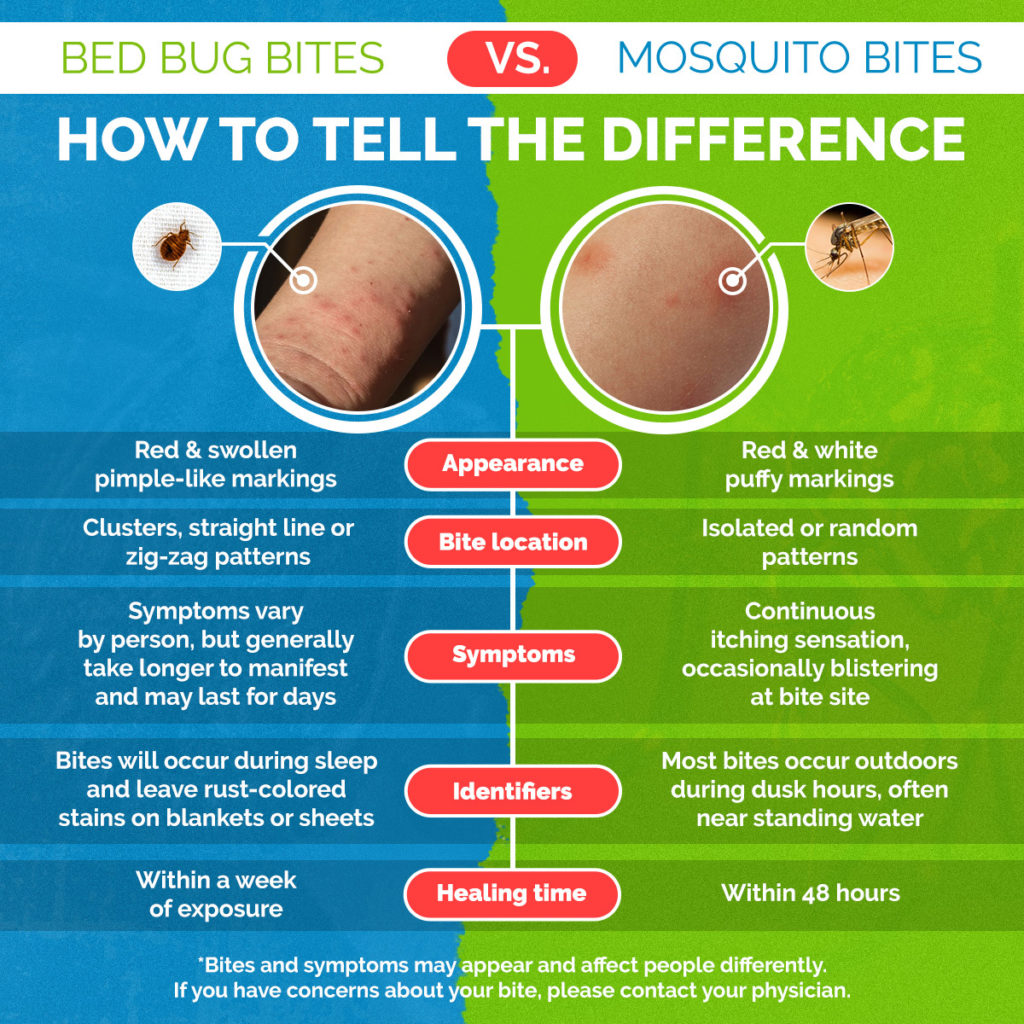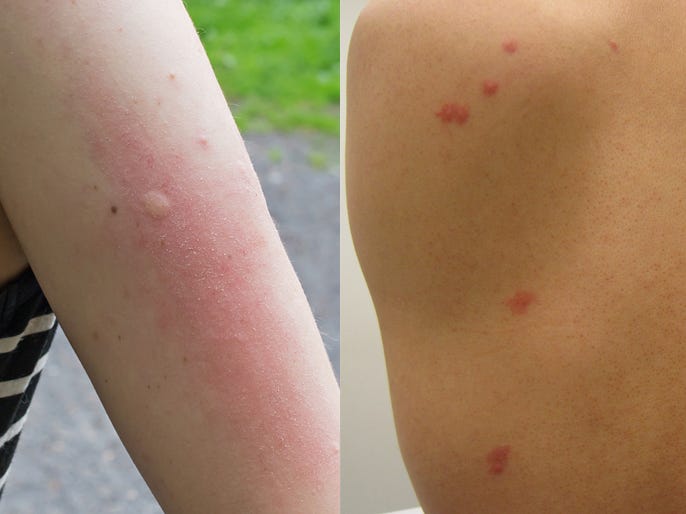Bed bug bites typically appear in a line or cluster and may become irritatingly itchy. Mosquito bites are usually spaced apart, more random in pattern, and cause immediate redness and swelling.
Identifying the difference between bed bug bites and mosquito bites is essential for proper treatment and prevention. As unwelcome guests in your home, bed bugs tend to leave a tell-tale pattern of bites that can help you distinguish them from the more solitary and sporadic bites of mosquitoes.
Both types of bites can become apparent overnight, often leaving you to wonder what bit you as you slept. Being aware of the unique characteristics of each bite is key, not only for alleviating symptoms but also for taking the correct measures to rid your living space of these pests. Understanding these distinctions ensures you can promptly address the issue, leading to a better quality of sleep and peace of mind.
Identifying The Culprit
Knowing whether it’s bed bugs or mosquitoes behind those itchy bites is key. Both pests can disrupt your peace, but different methods will send them packing. Below are the clues that will help you figure out who’s the real pest in your home.
Visual Characteristics Of Bites
Examining the bites on your skin gives you the first hint.
- Bed bug bites often appear in a straight line or cluster.
- They may cause a red, swollen area with a dark spot in the center.
- Mosquito bites look like puffy, red bumps.
- Typically, they occur singly and are more random in placement.
Shape, pattern, and reaction time vary between the two. Bed bug bites might take days to become noticeable. Mosquito bites generally swell quickly and itch right away.
Timing And Location Of Bites
When and where you get bitten is a big clue to the culprit.
- Bed bugs prefer darkness and are most active at night.
- Their bites usually occur on exposed skin such as face, neck, arms, or hands.
- Mosquitoes strike at any time, especially during dusk or dawn.
- They usually bite any accessible skin, regardless of clothing coverage.
Keep track of the bite’s time and place. It can lead directly to the pest at fault. Focus on patterns and you’ll spot the difference between these sneaky biters.

Credit: pestgnome.com
Key Features Of Bed Bug Bites
The frustration of waking up with fresh bites can be overwhelming. Understanding the culprits behind these unwelcome marks is a crucial first step. Bed bug bites possess distinctive traits. Recognizing these can aid in proper identification and treatment.
Clustered Patterns Of Biting
One telltale sign of bed bug bites is their groupings. Unlike mosquitoes that bite at random, bed bugs tend to leave a trail of bites. These are often in a line or cluster on the skin. This pattern reflects the bed bug’s feeding habits as they move across your skin.
| Bed Bug Bites | Mosquito Bites |
|---|---|
| Clustered or in a line | Scattered and isolated |
Physical Reactions And Symptoms
Bed bug bites often cause intense itching. The affected area may also swell. The reaction can vary from person to person. Some individuals might experience minor irritation. Others may develop severe allergic reactions.
- Itching: Usually more intense than mosquito bites.
- Swelling: Raised, flat red welts are common.
- Duration: Symptoms may appear days after being bitten and last longer.
Hallmarks Of Mosquito Bites
Distinguishing between bed bug bites and mosquito bites is key to tackling the itch and discomfort. Let’s examine the unique signs of mosquito bites. With an understanding of these signs, one can promptly identify and treat the itchy adversaries.
Bite Appearance
- Rounded and puffy: Mosquito bites swell into rounded mounds shortly after the bite.
- Skin coloration: They often turn red but can also look like a raised area of skin.
- Random placement: Bites may appear randomly, not in a line or cluster.
Immediate Itch And Reaction
The itch of a mosquito bite is instant. It can cause a strong urge to scratch. Scratching can lead to more irritation or even infection. Look for these signs:
- Instant itchiness: An immediate tingle or itch after the bite occurs.
- A red welt: Accompanies the itch, becoming more pronounced with scratching.
- Decreasing symptoms: Itchiness and swelling often reduce after a few days without severe reactions.
Behavioral Differences Between Pests
Knowing the “Behavioral Differences Between Pests” is crucial in identifying whether you’ve been bitten by bed bugs or mosquitoes. From when they feed to where they live, these differences are key. This section will help you distinguish between these annoying biters.
Feeding Times
Bed bugs and mosquitoes differ drastically in their feeding habits.
- Bed bugs are nocturnal. They typically feed at night.
- They are attracted to the carbon dioxide we exhale when asleep.
- Mosquitoes, on the other hand, can bite at any time.
- Peak biting periods for mosquitoes are usually dusk and dawn.
Preferred Habitats
Understanding where these pests thrive is essential.
| Pest Type | Preferred Habitat |
|---|---|
| Bed Bugs | Inside homes, particularly in mattresses, box springs, bed frames, and other furniture. |
| Mosquitoes | Generally outdoors, near stagnant water sources like ponds and marshes. |
- Bed bugs stay close to sleeping areas to feed at night.
- Mosquitoes prefer outdoor environments but enter homes for food.
Allergic Responses And Infection Risks
Allergic Responses and Infection Risks often determine how we treat bug bites. Identifying whether a bite is from a bed bug or a mosquito is the first step in tackling these pesky intrusions. Yet, it’s crucial to understand the body’s possible reactions. Both bites can cause discomfort, but the severity and risks can differ significantly.
Severity Of Allergic Reactions
People react differently to bed bug and mosquito bites. Some individuals might just experience a tiny bump that itches a little. Others might have a more serious response.
Bed bug bites can cause:
- A red swollen area with a dark spot in the middle
- Itching or burning around the bite
- Clusters of bites in a zigzag or line
Mosquito bites might appear similar but typically:
- Swell up and become puffy
- Appear randomly, not in a pattern
- Cause immediate itching
Bold redness, swelling, or rash might indicate an allergic reaction. Severe reactions may need doctor care.
Potential For Disease Transmission
Beyond itching and discomfort, the risk of infection is a real concern. Bed bug and mosquito bites differ in their potential to spread disease.
Bed bugs are not known to transmit disease to humans. But scratching bites can lead to skin infections.
Mosquitoes can carry diseases like:
- Zika virus
- West Nile virus
- Malaria
Preventing mosquito bites becomes essential for health. Use repellents and nets to keep them away.
Preventive Measures
Staying protected from bed bugs and mosquitoes means less itching and more peace of mind. Knowing how to keep these pests away can save you from a lot of discomfort. Here are some effective preventative measures.
Protective Steps At Home
Keep bed bugs out of your home with these tips:
- Check second-hand furniture for signs of bed bugs before bringing it inside.
- Use protective covers on mattresses and box springs to prevent bed bugs from hiding in them.
- Reduce clutter where bed bugs can hide.
- Vacuum regularly to remove any potential bed bugs from the floor.
Personal Repellents And Strategies
Keep mosquitoes away using personal repellents and strategies.
- Apply insect repellent that contains DEET, picaridin, or lemon eucalyptus oil.
- Wear long sleeves and pants when outdoors during peak mosquito hours, usually dawn and dusk.
- Use mosquito nets when sleeping in areas with a high mosquito population.
- Install screens on windows and doors to keep mosquitoes outside.
Treatment Options For Bites
Treatment options for bite marks vary depending on the culprit. Whether it’s the work of bed bugs or mosquitoes, relief is a top priority. Begin with simple home treatments before considering over-the-counter options.
Home Remedies
Easy home solutions can soothe the itch and discomfort caused by bites. Try these safe options:
- Cold compress: A damp, chilled cloth can reduce swelling.
- Baking soda paste: Mix with water and apply to relieve itchiness.
- Aloe vera gel: Its natural cooling effect calms skin irritation.
- Calamine lotion: This old remedy still offers quick itch relief.
Over-the-counter Medications
When home remedies aren’t enough, over-the-counter options can help:
| Medication Type | Benefits |
|---|---|
| Antihistamines | Reduce itching and swelling. Offer allergy relief. |
| Hydrocortisone cream | Alleviate inflammation and suppress itchiness. |
| Pain relievers | Lessen discomfort from persistent bites. |
Always read labels carefully and follow instructions to ensure safe use.

Credit: www.carolinapest.com
Professional Pest Control Solutions
Facing relentless itching and suspicious bites often leads to the great bed bug vs mosquito debate. Identifying the culprit is the first step, but what happens when the infestation is beyond a simple DIY solution? Enter professional pest control solutions, where expertise meets efficiency to restore peace and comfort to your home.
When To Call For Help
Distinguishing between bed bug and mosquito bites can be tricky, but knowing when to seek professional help is crucial. If you notice any of these signs, it’s time to call the experts:
- Multiple bites in a linear pattern
- Bites that persist for days or worsen
- Signs of an infestation, such as tiny blood spots on sheets
Taking action early can prevent a larger infestation and ensure a faster resolution to the biting dilemma.
What To Expect From Experts
Enlisting the help of pest control professionals means you’re seeking an end to those itchy bites. Here’s what the experts bring:
| Expertise | Methodology | Post-Treatment |
|---|---|---|
| Trained technicians | Strategic treatment plans | Follow-up inspections |
| Precise identification of pests | Safe and targeted application | Recommendations for preventing re-infestations |
With their specialized knowledge, professionals address the root cause, ensuring a long-term solution to your pest problem.
Long-term Strategies To Avoid Bites
An incessant itch can be the unwanted souvenir of pesky bed bug or mosquito bites. Distinguishing between these irritants is step one, but the real victory lies in prevention. Embrace long-term strategies to keep these bites at bay.
Bedroom Hygiene Practices
Maintaining a clean bedroom is crucial. Start with these simple steps:
- Wash beddings weekly in hot water.
- Vacuum your bedroom regularly, focusing on cracks and crevices.
- Declutter to minimize bed bug hiding spots.
- Inspect second-hand furniture before bringing it home.
- Use protective covers on mattresses and pillows to prevent bed bug entry.
Mosquito Control In The Environment
Combat mosquito populations outside your home as well:
| Action | Benefit |
|---|---|
| Remove standing water | Eliminates mosquito breeding grounds |
| Plant mosquito-repellent flora | Natural deterrence with plants like citronella |
| Install screens | Keeps mosquitoes outside |
| Use outdoor fans | Disperses mosquitoes with air flow |
Understanding The Implications
An itch in the night might be more than just a small annoyance. Distinguishing between bed bug bites and mosquito bites is crucial. Each has different implications on your well-being.
Impact On Sleep Quality
Bites at night could mean a troubled sleep. Bed bugs and mosquitos disturb rest in different ways. A good night’s sleep is essential for health. Let’s explore how these bites affect sleep quality.
- Bed Bug Bites: They may cause you frequent awakenings. Restlessness could prevail.
- Mosquito Bites: The buzzing sound alone can keep you up. Plus, itching from the bites might interrupt sleep.
Psychological Effects Of Bug Bites
Bug bites impact more than just the skin. Know the psychological effects linked to these itchy invaders.
| Type of Bite | Emotional Impact |
|---|---|
| Bed Bug Bites | May cause anxiety or stress about potential infestations. |
| Mosquito Bites | Usually result in temporary discomfort and irritation. |
Both bites can affect mood. Awareness aids in managing responses to such bug bites.

Credit: www.greenpestsolutions.com
Frequently Asked Questions For How To Tell Bed Bugs Vs Mosquito Bites?
What Are The Key Differences Between Bed Bug And Mosquito Bites?
Bed bug bites typically appear in a straight line or cluster on the skin and can cause a pronounced, itchy red welt. Mosquito bites are more randomly scattered, usually puff up quickly, and may start to itch immediately after being bitten.
How To Identify Bed Bug Bites?
Bed bug bites often manifest as small, flat, or raised areas that may become inflamed, itchy, and red. They tend to occur on exposed areas such as the face, neck, hands, or arms and may present in a zigzag or line pattern.
Can Bed Bug Bites Resemble Mosquito Bites?
Yes, bed bug bites can resemble mosquito bites, but they often have a distinct pattern and may appear more grouped together. They also tend to cause more intense itching and last longer than mosquito bites.
What Are The Signs Of An Allergic Reaction To Bites?
An allergic reaction to bites can include severe itching, hives, a large area of swelling around the bite, or anaphylaxis. If breathing difficulties, dizziness, or swelling of the face and mouth occur, seek medical attention immediately.
Conclusion
Distinguishing between bed bug and mosquito bites can be a challenge, but it’s crucial for effective treatment. Remember, bed bug bites often appear in lines or clusters, while mosquito bites are more random and singular. Stay vigilant for signs of infestation and consult a professional if needed.
Identifying the culprit correctly is the first step in ensuring a bite-free, peaceful rest.
Related posts:

I’m MD Tanvir, and I bring years of expertise gained from working closely with pest control companies to the forefront. My journey in the industry has inspired me to launch Bug Battler, a platform aimed at equipping people with the know-how to combat pests autonomously. Through Bug Battler, I aim to empower individuals with practical insights to tackle pest infestations effectively.

